Module 10 Unit 2 My mother's cleaning our houses and sweeping away bad luck.( 课件)(共27张PPT) 七年级英语上册
文档属性
| 名称 | Module 10 Unit 2 My mother's cleaning our houses and sweeping away bad luck.( 课件)(共27张PPT) 七年级英语上册 |

|
|
| 格式 | pptx | ||
| 文件大小 | 5.0MB | ||
| 资源类型 | 教案 | ||
| 版本资源 | 外研版 | ||
| 科目 | 英语 | ||
| 更新时间 | 2023-10-14 16:19:30 | ||
图片预览

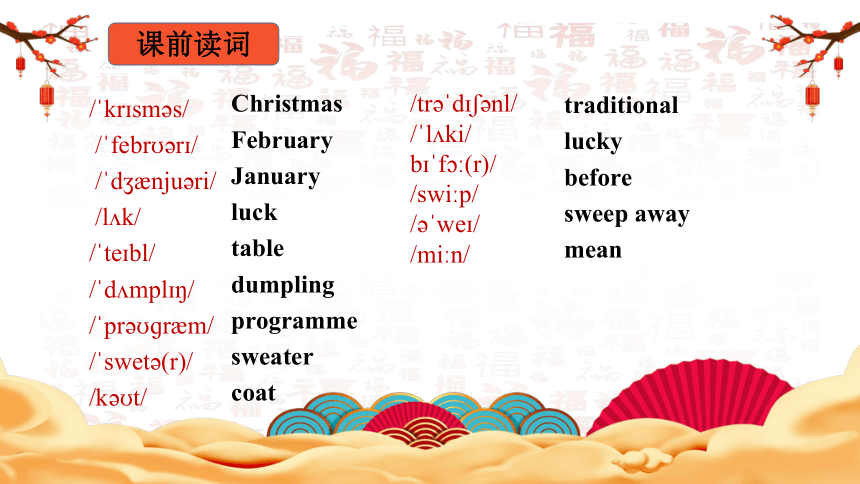
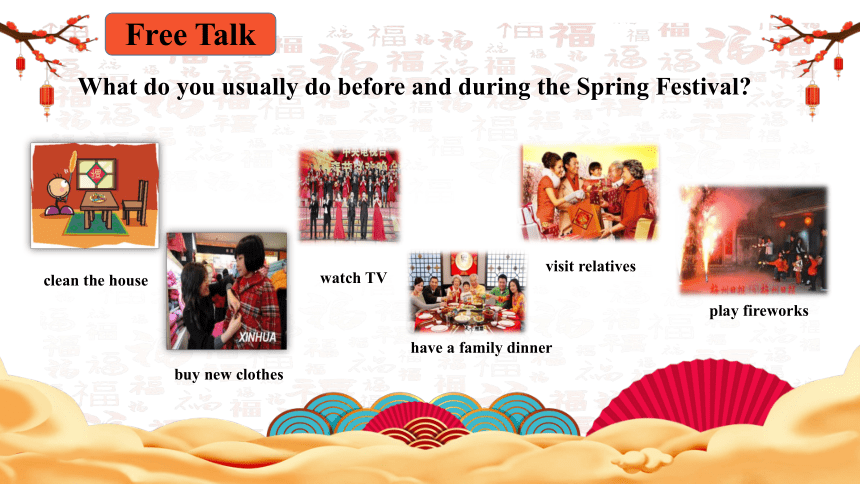
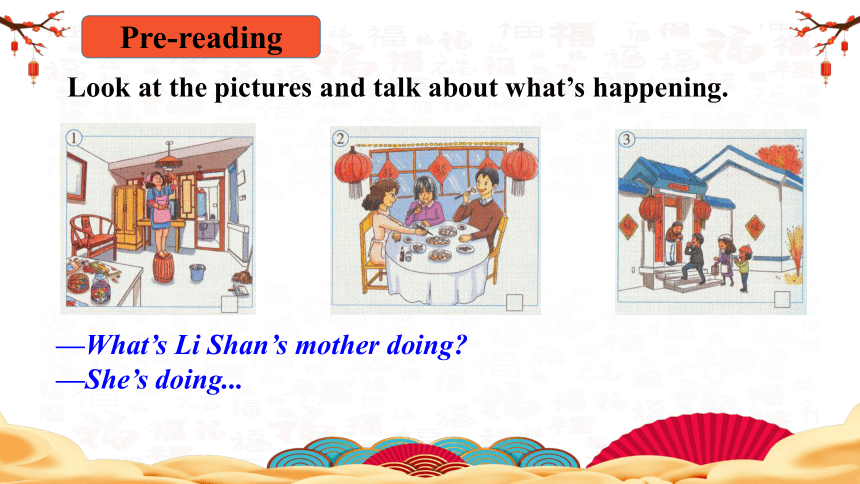
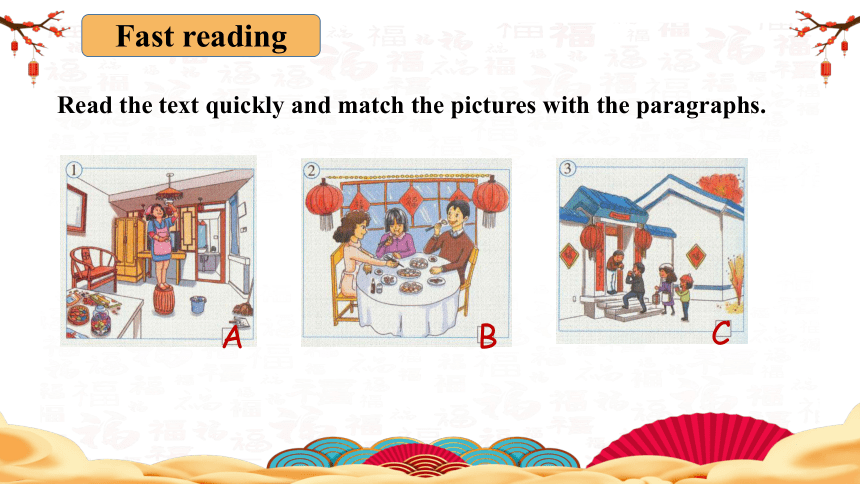
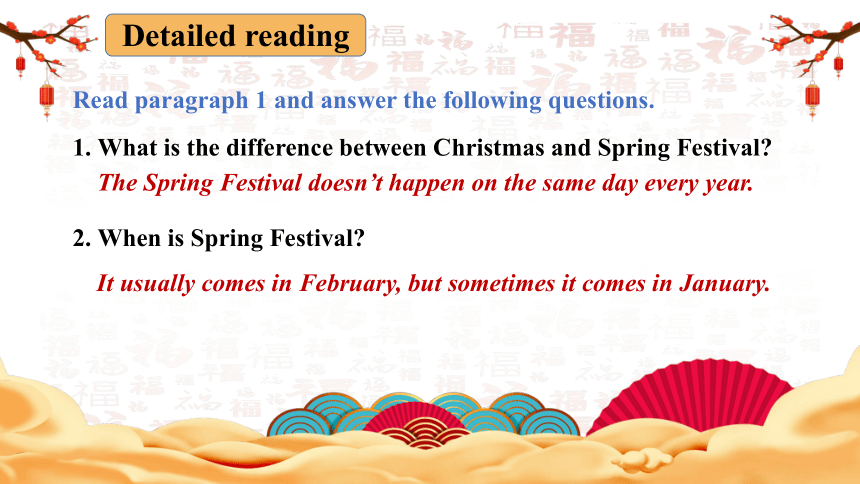
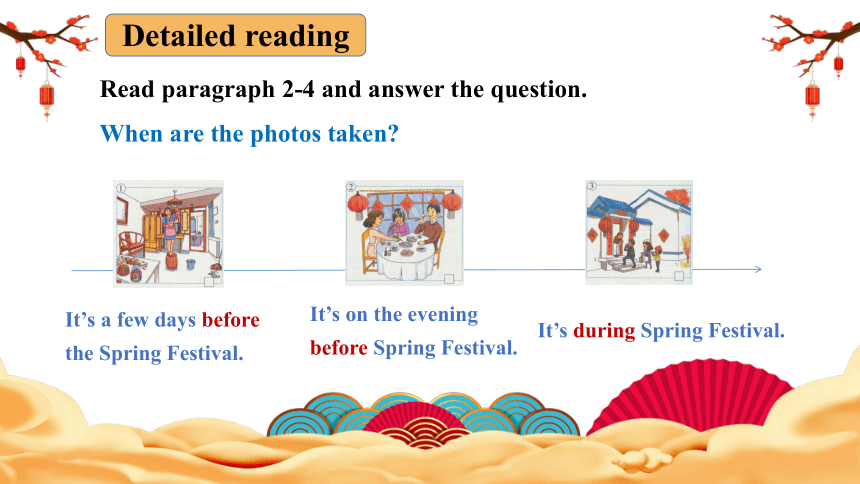
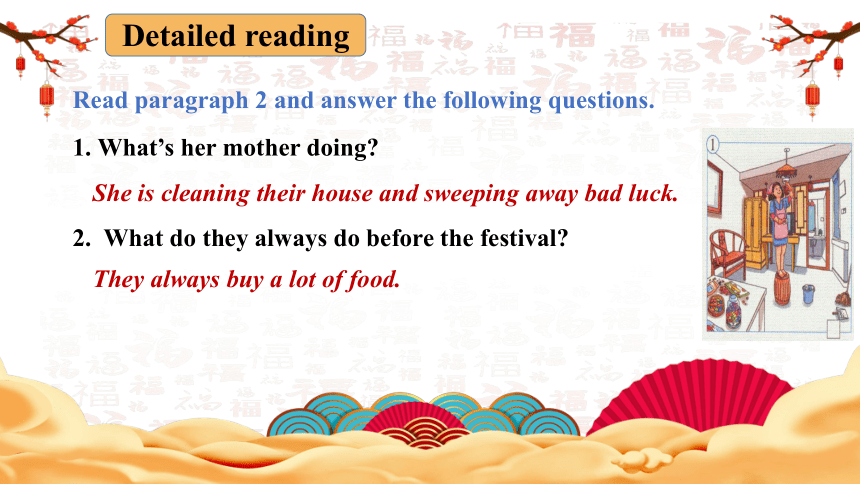
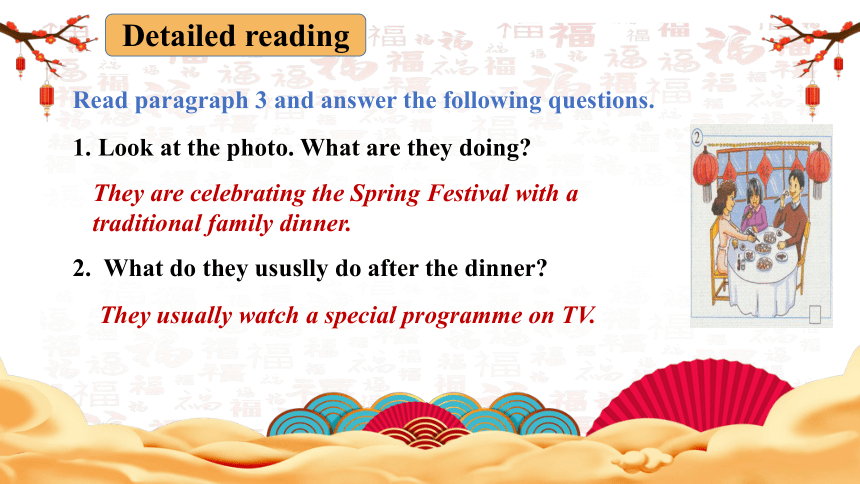
文档简介
(共27张PPT)
Module 10
Spring Festival
Unit2 My mother’s cleaning our house and sweeping away bad luck.
/ kr sm s/
/ febr r /
/ d nju ri/
/l k/
/ te bl/
/ d mpl /
/ pr ɡr m/
/ swet (r)/
/k t/
Christmas
February
January
luck
table
dumpling
programme
sweater
coat
/tr d nl/
/ l ki/
b f (r)/
/swi p/
/ we /
/mi n/
traditional
lucky
before
sweep away
mean
课前读词
Free Talk
What do you usually do before and during the Spring Festival
clean the house
buy new clothes
watch TV
have a family dinner
visit relatives
play fireworks
Look at the pictures and talk about what’s happening.
Pre-reading
—What’s Li Shan’s mother doing
—She’s doing...
Read the text quickly and match the pictures with the paragraphs.
Fast reading
A
B
C
1. What is the difference between Christmas and Spring Festival
2. When is Spring Festival
Detailed reading
Read paragraph 1 and answer the following questions.
It usually comes in February, but sometimes it comes in January.
The Spring Festival doesn’t happen on the same day every year.
Detailed reading
Read paragraph 2-4 and answer the question.
When are the photos taken
It’s a few days before the Spring Festival.
It’s on the evening before Spring Festival.
It’s during Spring Festival.
1. What’s her mother doing
2. What do they always do before the festival
Detailed reading
Read paragraph 2 and answer the following questions.
They always buy a lot of food.
She is cleaning their house and sweeping away bad luck.
1. Look at the photo. What are they doing
2. What do they ususlly do after the dinner
Detailed reading
Read paragraph 3 and answer the following questions.
They usually watch a special programme on TV.
They are celebrating the Spring Festival with a traditional family dinner.
1. Look at the photo. What are they doing
2. What does Li Shan always get
Detailed reading
Read paragraph 4 and answer the following questions.
She always get a hongbao.
They are visiting Li Shan’s uncles and aunts.
a few days before the Spring Festival.
on the evening before Spring Festival.
Group work
Introduce the Spring Festival with the help of these photos.
It’s during Spring Festival.
Critical thinking
Why do you think the Spring Festival is very important in our country
It’s a traditional festival and it has a long history for thousands of years.
It marks the end of the old year and it is the beginning of a new year.
It’s a festival when families can get together and have fun.
词汇/句型复习
Talk about what they are/ aren’t doing.
---The girl is not making lanterns.
---They are eating Jiaozi.
---...
a few days before the Spring Festival.
on the evening before Spring Festival.
Introduce the Spring Festival with the help of these photos.
It’s during Spring Festival.
Retelling
Free talk
He/ She is …
singing
dancing
cooking
eating
Present
1. Are you getting ready for Spring Festival
2. What’s your mother doing
3. She’s cleaning the house.
4. I’m eating jiaozi.
5. My mother’s cleaning our house and sweeping away bad luck.
Look at these sentences.
现在进行时的陈述句形式和疑问句形式(一般疑问句和特殊疑问句)。
现在进行时的陈述句
例:She’s cleaning the house.
基本结构:主语+ be(am/is/are)+doing+…
现在进行时的一般疑问句
例:Are you getting ready for Spring Festival
基本结构:Be(am/is/are)+主语+doing+…
现在进行时的特殊疑问句
例:What’s your mother doing
基本结构:特殊疑问词+Be(am/is/are)+主语+doing
现在进行时的特殊疑问句
特殊疑问词+一般疑问句?
{特殊疑问词+ Be(am/is/are)+主语+doing+… }
例:Are you getting ready for Spring Festival
基本结构:主语+ be(am/is/are)+doing+…
一般现在时VS.现在进行时
1. 表示说话时正在发生或者进行的动作。
e.g. She is preparing for Spring Festival.
I am writing a letter.
2. 表示在现在相对较长一段时间内正在进
行的动作,但是说话那一刻不一定在做。
e.g. David is teaching English and learning
Chinese in Beijing.
现在进行时用法:
一般现在时用法:
1. 表示现在的状态: She is seven.
2. 表经常或习惯性的动作: I get up at 6:30 every day.
3. 表主语具备的性格和能力等: They speak French.
4. 普遍真理、自然规律和客观事实: The moon goes around the earth.
5. 谈论籍贯、国籍等: Where do you come from
6. 谈论时间表、旅程表等: Tomorrow is Thursday.
Summary
不同 构成 例句 时间状语 例句
现在进行时 由“助动词 be (am, is / are) + 动词-ing” She is doing her homework now. now Listen! Who is singing over there
一般现在时 由(be动词是is, am, are), 行为动词是原形或动词三单 - Are you a teacher Yes, I am. / No, I’m not. He plays football every day. always, often, usually, sometimes, usually, never, everyday/week/ month/year/onSunday/in the morning/afternoon/ evening, now, today every day, every week, on Sundays, three times a week… I write to my uncle every month.
Practice
根据语境及提示用现在进行时完成句子。
1. ________ he ________(run) in the playground
2. —________ you ________(draw) in the room
—No. We’re playing.
3. Look. He __________ (sleep) over there
4. She can’t go there. Because she __________(study) in her room
5. The film is on. ________ they ________(see) it in the cinema
Is running
Are drawing
is sleeping
is studying
Are seeing
Work in pairs: Ask and answer, then write.
A: What is he/she doing
B: He /She is ......
Production
Homework
必做:
1.掌握现在进行时陈述句及疑问句型,变式造句10组。
2.复习并背过本单元的知识点、复述课文。
选做:
参考春节短文,搜集资料,运用现在进行时,写一篇关于圣诞节的短文。
Thanks for your listening!
Module 10
Spring Festival
Unit2 My mother’s cleaning our house and sweeping away bad luck.
/ kr sm s/
/ febr r /
/ d nju ri/
/l k/
/ te bl/
/ d mpl /
/ pr ɡr m/
/ swet (r)/
/k t/
Christmas
February
January
luck
table
dumpling
programme
sweater
coat
/tr d nl/
/ l ki/
b f (r)/
/swi p/
/ we /
/mi n/
traditional
lucky
before
sweep away
mean
课前读词
Free Talk
What do you usually do before and during the Spring Festival
clean the house
buy new clothes
watch TV
have a family dinner
visit relatives
play fireworks
Look at the pictures and talk about what’s happening.
Pre-reading
—What’s Li Shan’s mother doing
—She’s doing...
Read the text quickly and match the pictures with the paragraphs.
Fast reading
A
B
C
1. What is the difference between Christmas and Spring Festival
2. When is Spring Festival
Detailed reading
Read paragraph 1 and answer the following questions.
It usually comes in February, but sometimes it comes in January.
The Spring Festival doesn’t happen on the same day every year.
Detailed reading
Read paragraph 2-4 and answer the question.
When are the photos taken
It’s a few days before the Spring Festival.
It’s on the evening before Spring Festival.
It’s during Spring Festival.
1. What’s her mother doing
2. What do they always do before the festival
Detailed reading
Read paragraph 2 and answer the following questions.
They always buy a lot of food.
She is cleaning their house and sweeping away bad luck.
1. Look at the photo. What are they doing
2. What do they ususlly do after the dinner
Detailed reading
Read paragraph 3 and answer the following questions.
They usually watch a special programme on TV.
They are celebrating the Spring Festival with a traditional family dinner.
1. Look at the photo. What are they doing
2. What does Li Shan always get
Detailed reading
Read paragraph 4 and answer the following questions.
She always get a hongbao.
They are visiting Li Shan’s uncles and aunts.
a few days before the Spring Festival.
on the evening before Spring Festival.
Group work
Introduce the Spring Festival with the help of these photos.
It’s during Spring Festival.
Critical thinking
Why do you think the Spring Festival is very important in our country
It’s a traditional festival and it has a long history for thousands of years.
It marks the end of the old year and it is the beginning of a new year.
It’s a festival when families can get together and have fun.
词汇/句型复习
Talk about what they are/ aren’t doing.
---The girl is not making lanterns.
---They are eating Jiaozi.
---...
a few days before the Spring Festival.
on the evening before Spring Festival.
Introduce the Spring Festival with the help of these photos.
It’s during Spring Festival.
Retelling
Free talk
He/ She is …
singing
dancing
cooking
eating
Present
1. Are you getting ready for Spring Festival
2. What’s your mother doing
3. She’s cleaning the house.
4. I’m eating jiaozi.
5. My mother’s cleaning our house and sweeping away bad luck.
Look at these sentences.
现在进行时的陈述句形式和疑问句形式(一般疑问句和特殊疑问句)。
现在进行时的陈述句
例:She’s cleaning the house.
基本结构:主语+ be(am/is/are)+doing+…
现在进行时的一般疑问句
例:Are you getting ready for Spring Festival
基本结构:Be(am/is/are)+主语+doing+…
现在进行时的特殊疑问句
例:What’s your mother doing
基本结构:特殊疑问词+Be(am/is/are)+主语+doing
现在进行时的特殊疑问句
特殊疑问词+一般疑问句?
{特殊疑问词+ Be(am/is/are)+主语+doing+… }
例:Are you getting ready for Spring Festival
基本结构:主语+ be(am/is/are)+doing+…
一般现在时VS.现在进行时
1. 表示说话时正在发生或者进行的动作。
e.g. She is preparing for Spring Festival.
I am writing a letter.
2. 表示在现在相对较长一段时间内正在进
行的动作,但是说话那一刻不一定在做。
e.g. David is teaching English and learning
Chinese in Beijing.
现在进行时用法:
一般现在时用法:
1. 表示现在的状态: She is seven.
2. 表经常或习惯性的动作: I get up at 6:30 every day.
3. 表主语具备的性格和能力等: They speak French.
4. 普遍真理、自然规律和客观事实: The moon goes around the earth.
5. 谈论籍贯、国籍等: Where do you come from
6. 谈论时间表、旅程表等: Tomorrow is Thursday.
Summary
不同 构成 例句 时间状语 例句
现在进行时 由“助动词 be (am, is / are) + 动词-ing” She is doing her homework now. now Listen! Who is singing over there
一般现在时 由(be动词是is, am, are), 行为动词是原形或动词三单 - Are you a teacher Yes, I am. / No, I’m not. He plays football every day. always, often, usually, sometimes, usually, never, everyday/week/ month/year/onSunday/in the morning/afternoon/ evening, now, today every day, every week, on Sundays, three times a week… I write to my uncle every month.
Practice
根据语境及提示用现在进行时完成句子。
1. ________ he ________(run) in the playground
2. —________ you ________(draw) in the room
—No. We’re playing.
3. Look. He __________ (sleep) over there
4. She can’t go there. Because she __________(study) in her room
5. The film is on. ________ they ________(see) it in the cinema
Is running
Are drawing
is sleeping
is studying
Are seeing
Work in pairs: Ask and answer, then write.
A: What is he/she doing
B: He /She is ......
Production
Homework
必做:
1.掌握现在进行时陈述句及疑问句型,变式造句10组。
2.复习并背过本单元的知识点、复述课文。
选做:
参考春节短文,搜集资料,运用现在进行时,写一篇关于圣诞节的短文。
Thanks for your listening!
同课章节目录
- Starte
- Module 1 My teacher and my friends
- Module 2 My English lesson
- Module 3 My English book
- Module 4 My everyday life
- Module 1 My classmates
- Unit 1 Nice to meet you.
- Unit 2 I'm Wang Lingling and I'm thirteen years ol
- Unit 3 Language in use.
- Module 2 My family
- Unit 1 Is this your mum?
- Unit 2 These are my parents.
- Unit 3 Language in use.
- Module 3 My school
- Unit 1 There are thirty students in my class.
- Unit 2 The library is on the left of the playgroun
- Unit 3 Language in use.
- Module 4 Healthy food
- Unit 1 We've got lots of apples.
- Unit 2 Is your food and drink healthy?
- Unit 3 Language in use.
- Module 5 My school day
- Unit 1 I love history.
- Unit 2 We start work at nine o'clock.
- Unit 3 Language in use.
- Revision module A
- Module 6 A trip to the zoo
- Unit 1 Does it eat meat?
- Unit 2 The tiger lives in Asia.
- Unit 3 Language in use.
- Module 7 Computers
- Unit 1 How do I write my homework on the computer?
- Unit 2 When do you use a computer?
- Unit 3 Language in use.
- Module 8 Choosing presents
- Unit 1 I always like birthday parties.
- Unit 2 She often goes to concerts.
- Unit 3 Language in use.
- Module 9 People and places
- Unit 1 We're enjoying the school trip a lot.
- Unit 2 They're waiting for buses or trains.
- Unit 3 Language in use.
- Module 10 Spring Festival
- Unit 1 Are you getting ready for Spring Festival?
- Unit 2 My mother's cleaning our houses and sweepin
- Unit 3 Language in use.
- Revision module B
